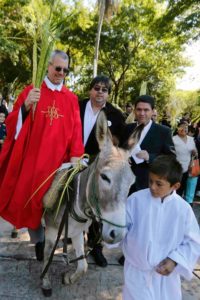
You will sometimes hear that Jesus never claimed to be the Messiah. The argument goes that this was all due to his worked-up disciples who took the simple musings of an itinerant rabbi and got carried away. He came to say “Niceness is nice” and pat children on the head and remind us to recycle, but those darn fishermen and tax collectors got so excited about this that they somehow got the fixed impression that he claimed to be the heir of David and God Incarnate. Then, owing to the fact that people then were two thousand years stupider than we are, it was inevitable that everybody in the world would quickly and easily believe this misunderstanding and undergo crucifixion, beheading, and the stake rather than ask, “Perhaps there has been a mistake somewhere.”
And they say the Middle Ages were the “age of faith.”
Here’s the thing: if you want to understand what’s happening on Palm Sunday, what you need to know is that Jesus is doing everything but hiring a skywriter to tell the world that he is the Messiah. But to get his point, you need to know the one thing that almost no modern knows anymore: biblical history.
The reason almost nobody knows biblical history is simple: they don’t read the Bible (and they often don’t think any of it is history). It reminds me of a time I was in Ireland doing a radio interview and the guy asked me, “You don’t mean to tell me you take the Bible literally, do you?” I asked him, “Which part?”
He looked at me in paralytic confusion and stammered, “What do you mean?”

I said, “Do you mean ‘Do you believe in talking snakes?’ or do you mean ‘Do you think David hid in the cave of Adullam to get away from Saul’s death squads?’ If the former, then no. If the latter, then yes.”
The guy replied, “Look. I don’t know anything about the Bible.”
Precisely. Which is why we should beware simplicities about “Not taking the Bible literally.” I take parts that are meant literally (i.e. as historical accounts) to be historical accounts. I don’t take parts that are meant to be myth, legend, poetry, apocalyptic literature, or fiction literally.
Now as it happens, the Old Testament has a quite readable chronicle of the reign of King David and his son Solomon (and their heirs) in 1 and 2 Samuel and 1 and 2 Kings (you can find much of the same material in 1 and 2 Chronicles). The reason this era is so copiously documented is that these are the court (and temple) records of the ruling classes of Israel. You learned this story as an ancient Jew the way Americans learned the stories of the American Revolution and the Civil War: to see where you came from, to learn from their tragic mistakes, and to try figure out what was right (indistinguishable from the will of God in the Jewish mind) and what was to come.
In short, the story of David was, after the story of Moses and the Exodus, the second most important story in the world as far as Jews in the first century went. If Moses and the Exodus was as well known to Jesus’ audience as Star Wars is today, the story of David was as well known as The Empire Strikes Back. The characters, the lines of dialog, the scenes: Everybody knew the whole thing by heart and everybody furnished their thinking with allusions to that story just as somebody today needs only to breathe heavily to make everybody in the room think of Darth Vader. The Adventures of David (and the story of the Exodus) were the common cultural currency of Jesus and his audience.
So imagine that it’s the year 2019. An American Democrat tells the press he has a Very Special Announcement. He’s not just some random Mayor. He’s a guy around whom Presidential Buzz has been buzzing for the past six months, a rising star in the party who gave that Big Speech that galvanised the Democratic base. The One Everybody is Talking About. Lots of people are asking “Is This The Guy?”
Finally, the day arrives and he meets with the press, not in his office, but at Valley Forge. He gets Lin-Manuel Miranda to come, dressed in a frock coat and performing tunes from Hamilton, to open for him. Then he gives a dramatic speech full of quotations from Washington’s First Inaugural and demanding that we return to our roots and turn away from the corruption of Business as Usual, etc.
Question: Who is he identifying himself with?
Correct: George Washington. He knows that his American audience will get the connections immediately.
Now here’s the thing: in the story of David and Solomon, David is promised by Nathan the prophet that God will establish his kingdom eternally and that one of his sons will always reign upon his throne:
[T]he Lord declares to you that the Lord will make you a house. When your days are fulfilled and you lie down with your fathers, I will raise up your offspring after you, who shall come forth from your body, and I will establish his kingdom. He shall build a house for my name, and I will establish the throne of his kingdom forever. I will be his father, and he shall be my son. When he commits iniquity, I will chasten him with the rod of men, with the stripes of the sons of men; but I will not take my merciful love from him, as I took it from Saul, whom I put away from before you. And your house and your kingdom shall be made sure for ever before me; your throne shall be established for ever. (2 Sa 7:11–16).

So when David is nearing death, he chooses from among his sons his successor, Solomon. And after a tussle with his brother Adonijah who tries to steal the throne, Solomon rides into Jerusalem, not on a war horse, like Pharaoh, but on an ass to demonstrate his humility to the people as the original “son of David”.
Other sons of David will come and go, of varying quality, over the next several centuries. And the day will finally come when the last one sits upon a physical throne before he is packed off to Babylon, forced to watch his sons die before his eyes, and then his eyes are put out.
But strangely, the Jewish people do not give up on the promise of an eternal kingdom made to David. Instead, they listen to prophets like Isaiah who promise them an extraordinary restoration of the House of David as the lopped off stump of Jesse (David’s father) puts forth a “shoot” and a new son of David arises to restore Israel’s fortunes and leads the nation to conquer all its ancestral enemies (Isaiah 11:1-16). This Davidic King is called by the prophets the “Anointed One” or “Messiah”.
The term “son of David” is therefore fraught with meaning on the morning of Palm Sunday. And when Jesus mounts an ass and rides into Jerusalem in exactly the way the first son of David, Solomon, did, the meaning is not lost on anybody, least of all Jesus himself.
That’s why this exchange happens:
As he was now drawing near, at the descent of the Mount of Olives, the whole multitude of the disciples began to rejoice and praise God with a loud voice for all the mighty works that they had seen, saying, “Blessed is the King who comes in the name of the Lord! Peace in heaven and glory in the highest!” And some of the Pharisees in the multitude said to him, “Teacher, rebuke your disciples.” He answered, “I tell you, if these were silent, the very stones would cry out.” (Lk 19:37–40).
The crowd is hailing him as “King” because the crowd understands the point of Jesus riding an ass in triumph into Jerusalem. So do the Pharisees, which is why they demand he silence them. And so does Jesus, which is why he does not.
And it’s why the Church has, ever after, always shouted “Hosanna to the Son of David” every Palm Sunday since. It’s how you hail the Messiah.
